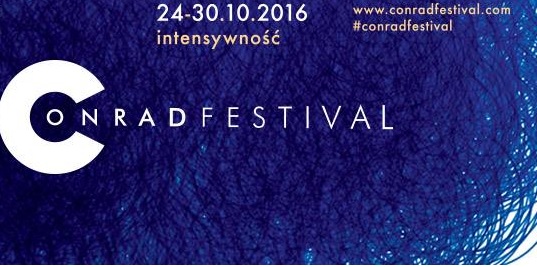A fight for every pair of eyes
Day three: emotions at the Conrad Festival
From private emotions, born around the family table, through emotions connected with the feeling of power, to the intense experience of reality – this was the path, travelled by the participants of the Conrad Festival together with the invited guests.
October 28, 2016 -
New Eastern Europe
-
Articles and Commentary

At the very beginning, Błażej, Jan and Maria Peszek discussed family emotions with Katarzyna Kubisiowska. Jan started the meeting on an upbeat note: “I love youth as such, I can understand young people well and I am not jealous of anything. I get some signs of acceptance as an actor”. Błażej, asked about the feeling of happiness, said that the most important thing is to register the moments. He also told us about his path towards independence and the difficult, sometimes painful relationship with his father: “I respected him too much, I trusted him blindly, and fostered his despotism”. Maria combined family matters and the artistic aspects of her life into one story, admitting that she quickly realised that working with her father is not a pleasant experience for her. She confessed that she did not want to murder him on stage, and that is how it would have to end, due to the similarity of their characters: “The stage is like war, it is a great process, a struggle for each pair of eyes.” When Katarzyna Kubisiowska asked Jan about how he felt when his children chose their own artistic paths, he admitted that he went through a certain kind of hell, when Maria and Błażej were his students. The meeting with Peszek family allowed us not only to touch upon the privacy of artists, it was also a demonstration how to conduct a family and artistic dialogue, in spite of emotional involvement, differences in temperaments and beliefs.
The meeting with Eustachy Rylski, hosted by Paweł Reszka was yet another encouragement to dialogue, which captivated the audience. The writer called upon people to become involved, he also brought attention to the unnatural situation, in which artists, intellectuals and writers separate themselves from politics: “The iron curtain between politicians and artists was closed shut from both sides. Creators think that it is something that they ought not to do. If a writer makes a statement regarding national matters, it is considered to be extravagant, while in other countries writers become members of parliament, serve political functions and are candidates in the elections”. He also recalled the examples of outstanding politicians and writers: VáclavHavel and Winston Churchill, the latter of whom, despite saying that he is a “mediocre writer”, received a Literary Nobel Prize after all.
During the meeting with Robert Kusk, titled Love in dark times, Colm Tóibín discussed emotions, stemming from sensual, intense experience of the surrounding world. How is it that he has to constantly move between that which is known and that which is strange? The returns and departures enable him to always have fresh perspective. The writer admitted to not wanting to read Irish authors as a teenager, because he thought that they have nothing new to tell him. He was looking for dark literature, not things known from his everyday life. After many years, he realised that in foreign places he missed everything Irish – the bread, language and news. The absence of what was known prompted his need to write. The experience of the lack of something is what his novel, Nora Webster is based upon – the events from his home, when his father died. “I watched my mother intensively, more intensively than she was watching me”. Then, the author experienced the world in a very sensual manner and learned to select scraps and fragments, to which he assigned meanings.
No one else but artists can speak of emotions in such a fascinating and diverse way. During the meetings on Wednesday they shared things that excite and bother them, motivating them to create. The upcoming day will be devoted to landscapes – we will talk about them with Géza Röhrig, Sofia Andrukhovych, Andrzej Muszyński and Maciej Płaza.
Learn more about the Conrad Festival in Krakow: http://en.conradfestival.pl/

































